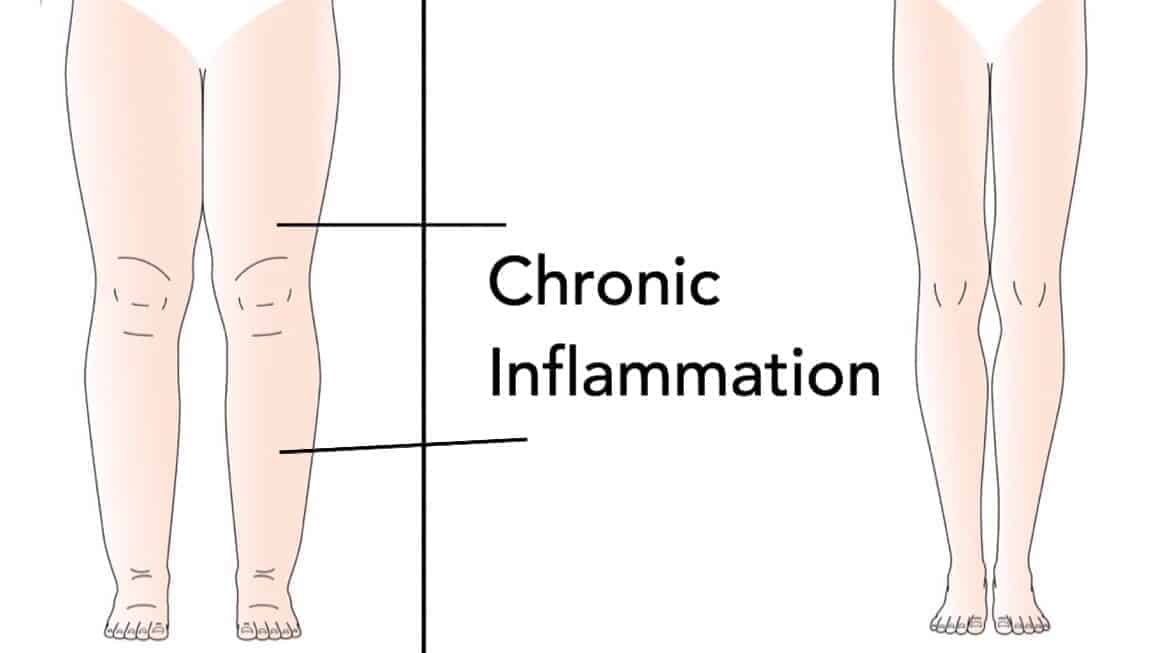What is inflammation?
You’ve probably heard the term ‘inflammation,’ but do you have a good understanding of what it is?
Inflammation is a vital defense mechanism of the body. Without it, we wouldn’t be able to neutralize things like bacteria, viruses, and toxins.
A response of the immune system, inflammation is the activation and deployment of proteins with “the aim being to remove harmful stimuli, including damaged cells, irritants, or pathogens – and begin the healing process.”
You’ve cut yourself before, right? What did the wound look like shortly after? Most likely, the skin around the cut appeared red and swollen. This reaction illustrates the immune system at work. The red and swollen area is a byproduct of the inflammatory response.
How is chronic inflammation different?
Chronic (long-term) inflammation is not a good thing, however. Monsour Mohamadzadeh, Ph.D., and director of the Center for Inflammation and Mucosal Immunology at the University of Florida, explains the difference:
“In a healthy situation, inflammation serves as a good friend to our body. But if immune cells start to overreact, that inflammation can be totally directed against us.”
10 Causes of Chronic Inflammation
Knowing the causes of the inflammation can help you beat it!
1. Being Overweight or Obese
Studies have shown that overweight people have higher concentrations of inflammatory proteins in fat cells. Obese women are especially at risk and are likelier to have higher inflammatory protein levels “AIF-1” than those within a healthy weight range.
2. Poor Gut Health
Certain things – such as antibiotics, disease, and poor diet – throw a wrench into our gut’s microbiome. While the word may sound like something out of a sci-fi movie, the microbiome is very real and vital. Our gut requires healthy amounts of good bacteria – and any disturbance to this balance can trigger inflammation.
3. Stress
Stress is a primary antagonist of many chronic health conditions – and it’s no surprise that the same goes for inflammation. In a recent study, researchers discovered that simply recalling a stressful past event can increase inflammation in the body.
4. Sleep Deprivation
An adequate amount of sleep (seven to nine hours for adults) is crucial for the body to repair itself. Our brain cleanses toxins and consolidates memory, and the body releases essential growth hormones, for example. In one study, a reactive protein that serves as a marker for inflammation levels was 25 percent higher in people who slept less than six hours per night.
5. Underlying Health Conditions
Addison’s, Crohn’s disease, and Celiac diseases, along with fibromyalgia, lupus, and psoriasis, are conditions that involve an over-stimulated immune system. Autoimmune disorders cause the body to constantly send inflammatory signals even without the presence of an outside danger. Then, the body attacks healthy tissue in response, leading to chronic inflammation. Certain bacteria and viruses also affect the regulation of the inflammatory response.
6. High Exposure to Toxins
Industrial chemicals and pollution can cause excess inflammation with long-term exposure. According to a comprehensive global review, air pollution can potentially damage every organ and cell in the body. People who live close to industrial sites or urban areas have the highest risk of developing chronic inflammation caused by pollution.
7. Untreated Acute Inflammation
Inflammation isn’t always damaging; it’s simply an immune response to a foreign threat such as bacteria, viruses, or an injury. However, when you have an untreated injury or infection, your body releases inflammatory proteins, which can lead to chronic inflammation.
8. Unhealthy Diet
Unfortunately, our modern diets have done a number on our health. Our bodies haven’t evolved for our highly processed diets, so eating these foods in excess causes poor health over time. As with other foreign threats like bacteria, our bodies respond to overly processed foods in the same manner by increasing inflammation.
9. Drinking Alcohol or Ingesting Drugs in Excess
Studies have shown that alcohol contributes to inflammation because it disrupts our gut microbiome. It also impairs the liver’s ability to filter out toxins, which can cause organ failure in severe cases. In addition, long-term drug abuse impairs the immune system and can lead to neuroinflammation.
10. Lack of Exercise or Overexercising
As with most things in life, we should always strive for a happy medium. Too much or too little of anything will usually lead to ill effects, such as inflammation. Overexercising may not seem harmful, but frequently engaging in high-intensity exercise can lead to chronic inflammation since your body won’t have time to heal. On the other hand, not exercising will cause a buildup of toxins, which will inevitably cause inflammation.
How Do I Get Rid of Inflammation?
Fortunately, advances in medicine have provided the answer to this important question. It is indeed possible to reverse chronic inflammation in many cases!
10 Efficient Ways to Reverse Inflammation
 1. Lose Weight to Reduce Inflammation
1. Lose Weight to Reduce Inflammation
Achieving and maintaining a healthy weight will help reduce inflammation in your body. Even a 5% reduction in weight can significantly lower inflammation levels. Aim for three days of exercise per week first, and then work your way up to five if possible. It’s recommended to get at least 150 minutes of moderate or intense physical activity each week.
2. Take Vitamin D.
In combination with a five to ten percent reduction in weight, individuals who supplement vitamin D may reduce their inflammation markers by nearly forty percent.
3. Take Fish Oil.
Omega-3 fatty acid has potent anti-inflammatory properties. Numerous studies have shown a reduction in inflammation levels in patients with various medical conditions who take fish oil supplements.
4. Meditate.
As stated, stress is a significant contributor to inflammation. Any activity that reduces stress levels is critical to helping maintain a healthy immune system. In a University of Wisconsin-Madison study, mindfulness-based stress reduction was more effective at lowering inflammation than other relaxation techniques.
However, any calming activity can help lower stress levels and inflammation. If you don’t enjoy meditating, you can do yoga, practice deep breathing, or even journal at bedtime.
5. Exercise.
Breaking a sweat helps us maintain a healthy weight and combat stress. A moderately-rigorous exercise regimen with an hour of aerobics and weight training 3-4 times weekly is recommended, though even a brisk walk is better than no exercise.
6. Follow an Anti-Inflammatory Diet.
As we stated above, one of the main reasons for inflammation in our modern world stems from an unhealthy diet. We often don’t have time to prepare healthy foods because of busy schedules, so we opt for fast foods instead. However, we pay the price for convenience with poor health in the long term.
To reduce inflammation, try to eat more fresh, whole foods such as fruits and vegetables. Even if you can’t eat fresh foods with every meal, choosing a healthier option more often will improve your health. Research shows that a Mediterranean diet that includes primarily plant-based foods can reduce inflammation, heart disease, and stroke.
7. Prioritize Sleep.
Most people suffer from sleep deprivation to some degree in the modern world. Make sure to stick to a sleep schedule and aim for seven to nine hours per night. The body and mind have a chance to recharge and heal during sleep, so it’s vital for overall health.
8. Avoid or Quit Smoking.
Smoking damages every cell in the body because it suppresses the immune system and triggers the release of pro-inflammatory proteins. It can also cause cancer, lung and vascular diseases, oral disease, and other health problems. However, by quitting smoking, you can reverse adverse health effects relatively quickly.
For instance, your circulation and lung function will improve just two weeks after quitting. In the first year, coughing and shortness of breath decrease, and the tiny hair-like structures in your lungs called cilia to resume normal functioning. After fifteen years, your risk of heart disease is similar to that of a non-smoker.
9. Work Less.
Overworking yourself can increase stress, which will lead to chronic inflammation. If possible, reduce your hours at work to part-time to manage stress and have a better work-life balance. Today, many people find that working 40 or more hours per week doesn’t offer enough downtime. Having a flexible schedule means prioritizing your health and family rather than work.
10. Practice Positive Thinking.
It’s sometimes challenging to maintain a positive outlook in our world today. However, try not to get caught up in the world’s news and events. Instead, focus on improving yourself and your life since you can’t control anything else regardless. By shifting your attention back to things you can control, you will start feeling more empowered and optimistic. Do the best you can with what you have, and let everything else take care of itself.
Final Thoughts on Causes and Treatment for Inflammation
The body and mind work together to carry out daily tasks and guide us through life. However, due to internal and external stressors, they can become imbalanced quite quickly in our modern world. Chronic stress can lead to inflammation, resulting in health problems such as heart disease, cancer, and other diseases. Therefore, it’s vital to reduce inflammation by maintaining a healthy lifestyle and managing stress.
Following the fundamental pillars of health, such as exercising, eating healthy, sleeping soundly, and practicing mindfulness, can keep inflammation (and stress) at bay.
















 Community
Community

